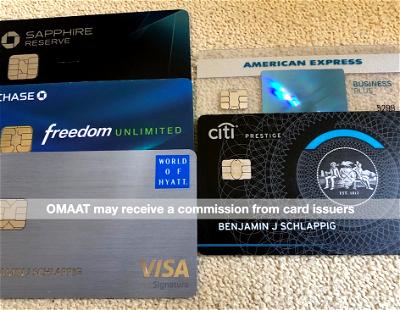I’m often asked by readers which credit card they should be using to maximize points for a given hotel stay, or if there’s an overall best hotel credit card.
Typically recommending which credit card is best for a particular bonus category (like dining, grocery stores, gas stations, everyday spending, etc.) is easy. That’s not really the case when recommending which credit card to use at hotels, though.
The added wrinkle with making this recommendation for stays at chain hotels is that you don’t just have to consider which credit cards broadly offer the best bonus categories for travel, but you also have to consider whether the hotel brand you’re staying at has a co-branded credit card that offers bonus points for stays at that specific brand.
In this post, I wanted to look at the most rewarding credit cards for hotel spending in general (regardless of the brand you’re staying at), and then compare that to the bonuses offered by specific co-branded hotel credit cards.
In this post:
The most rewarding credit cards for hotel spending
For this section, I’m excluding co-branded hotel credit cards. That’s because I’m looking at the cards that offer the best bonuses on hotel spending in general, rather than the best bonuses for a particular brand of hotel.
So, which major credit cards offer bonuses for hotel spending?
1. Chase Sapphire Reserve®
Reward for hotel spending: 5.1% (3x points, which I value at 1.7 cents each)
Card annual fee: $550
Learn more about the Chase Sapphire Reserve, apply for the Chase Sapphire Reserve.
2. Ink Business Preferred® Credit Card
Reward for hotel spending: 5.1% (3x points, which I value at 1.7 cents each)
Card annual fee: $95
Things to be aware of: This is a business card, and the 3x points is limited to the first $150,000 in combined purchases in bonus categories each account anniversary year
Learn more about the Ink Business Preferred, apply for the Ink Business Preferred.
3. American Express® Green Card
Reward for hotel spending: 5.1% (3x points, which I value at 1.7 cents each)
Card annual fee: $150 (Rates & Fees)
Learn more about the Amex Green, apply for the Amex Green.
The information and associated card details on this page for the American Express Green Card has been collected independently by OMAAT and has not been reviewed or provided by the card issuer.
4. Citi Premier® Card
Reward for hotel spending: 5.1% (3x points, which I value at 1.7 cents each)
Card annual fee: $95
Learn more about the Citi Premier, apply for the Citi Premier.
5. Chase Sapphire Preferred® Card
Reward for hotel spending: 3.4% (2x points, which I value at 1.7 cents each)
Card annual fee: $95
Learn more about the Sapphire Preferred, apply for the Sapphire Preferred.
6. Capital One Venture X Rewards Credit Card
Reward for hotel spending: up to 17% (10x miles on hotels booked through Capital One Travel) or 3.4% (2x miles otherwise). I value Capital One miles at 1.7 cents each.
Card annual fee: $395
Learn more about the Venture X, apply for the Venture X (Rates & Fees).
7. Capital One Spark Miles for Business
Reward for hotel spending: up to 8.5% (5x miles on hotels booked through Capital One Travel) or 3.4% (2x miles otherwise). I value Capital One miles at 1.7 cents each.
Card annual fee: $0 intro for first year; $95 after that
Learn more about the Spark Miles, apply for the Spark Miles (Rates & Fees).

The most rewarding co-branded hotel credit cards
As you can see above, there are four cards with the same return (by my valuation). All offer 3x transferable points, and all are points that I value at 1.7 cents each.
That means you’re looking at a return of ~5.1% regardless of which card you use. Do you get a better or worse return when using a co-branded hotel credit card?
To be comprehensive, let’s look at the co-branded credit cards issued by Choice Privileges, Hilton Honors, IHG One Rewards, Marriott Bonvoy, World of Hyatt, and Wyndham Rewards. First let me share how much I value a point in each of these currencies:
- Choice Privileges — 0.6 cents each
- Hilton Honors — 0.5 cents each
- IHG One Rewards — 0.5 cents each
- Marriott Bonvoy — 0.7 cents each
- World of Hyatt — 1.5 cents each
- Wyndham Rewards — 0.7 cents each
To keep things fairly simple, let’s look at the co-branded credit card(s) from each of the hotel groups that offers the highest return on hotel spending (keep in mind the main reason to get hotel credit cards could be for the elite status and free night certificates that they offer).
Choice Privileges
The Choice Privileges Select Mastercard offers 10x points on Choice spending, which I value at a return of 6%. This is excellent, and beats the return on spending offered by all transferable points cards.

Hilton Honors
The Hilton Honors American Express Aspire Card (review) offers 14x points on Hilton spending, which I value at a return of 7%. This is excellent, and beats the return on spending offered by all transferable points cards.
The information and associated card details on this page for the Hilton Honors American Express Aspire Card has been collected independently by OMAAT and has not been reviewed or provided by the card issuer.

IHG One Rewards
The IHG One Rewards Premier Credit Card (review) and IHG One Rewards Premier Business Credit Card (review) offer 10x points on IHG hotel spending, which I value at a return of 5%. This isn’t quite as good as the return on spending offered by some transferable points cards, though others may feel differently based on their valuation of points.

Marriott Bonvoy
The Marriott Bonvoy Boundless® Credit Card (review), Marriott Bonvoy Brilliant® American Express® Card (review), Marriott Bonvoy Bevy™ American Express® Card (review), and Marriott Bonvoy Business® American Express® Card (review) offer 6x points on Marriott hotel spending, which I value at a return of 4.2%. This isn’t as good as the return on spending offered by some transferable points cards.
That being said, some may wish to still use a Marriott co-branded credit card, since there aren’t many other ways to efficiently earn Bonvoy points. Furthermore, keep in mind that the Bonvoy Bevy Card offers 1,000 bonus points per eligible Marriott stay for cardmembers.

World of Hyatt
The World of Hyatt Credit Card (review) and World of Hyatt Business Credit Card (review) offer 4x points on Hyatt hotel spending, which I value at a return of 6%. This is excellent, and beats the return on spending offered by all transferable points cards.

Wyndham Rewards
The Wyndham Earner Business Card (review) offers 8x points on Wyndham hotel spending, which I value at a return of 5.6%. This is very good, and beats the return on hotel spending offered by transferable points cards.

Crunching the numbers
Everyone will value points differently, and those with different points valuations may also come up with different conclusions.
Personally, I think the Chase Sapphire Reserve®, Ink Business Preferred® Credit Card, American Express® Green Card, and Citi Premier® Card, offer the best general return on hotel spending, at 5.1%.
What’s surprising is that co-branded hotel credit cards largely don’t offer a better return for stays at their “own” hotels than these cards do for travel purchases.
Based on my valuation of hotel points:
- You should use the Choice Privileges Select Mastercard for Choice spending
- You should use the Hilton Honors American Express Aspire Card for Hilton spending
- You should use the World of Hyatt Credit Card or World of Hyatt Business Credit Card for Hyatt hotel spending
- You should use the Wyndham Earner Business Card for Wyndham hotel spending
The information and associated card details on this page for the Hilton Honors American Express Aspire Card and American Express Green Card has been collected independently by OMAAT and has not been reviewed or provided by the card issuer.

Other considerations with hotel spending
There are other potential considerations when deciding which hotel credit card to use:
- The Citi Prestige Card offers a fourth night free benefit on hotel stays, though this was considerably cut back as of September 2019, so it’s not nearly as useful as it used to be
- The Chase Sapphire Reserve® Card offers 10x points on hotels booked through the Chase Travel Portal, while the Capital One Venture X Rewards Credit Card offers 10x miles on hotels booked through the Capital One Travel Portal; for some people that could be worth it, though you’re often forgoing points or elite benefits directly with a hotel group when booking this way
- Amex Fine Hotels & Resorts offers extra perks for stays at certain hotels, and requires paying with an Amex Card; you can even earn 5x points on these bookings when prepaying with The Platinum Card® from American Express
- Often there are Amex Offers for discounts on hotel stays, which can make it worthwhile to use an Amex Card
- Often hotel credit cards have spending bonuses that could make them worth using, even if it leads to a slightly lower return on the points you earn:
- The World of Hyatt Credit Card makes it easy to earn elite status, as you receive two qualifying night credits toward your next tier status every time you spend $5,000 on your card, plus a second free night certificate when you spend $15,000 on the card in a year
- The Hilton Honors American Express Surpass® Card and Hilton Honors American Express Business Card offer a Hilton free night reward when you spend $15,000 on the card in a calendar year

Bottom line
In many cases, you’re actually not best off using a co-branded hotel card for your hotel spending, counterintuitive as it might be. Hilton and Hyatt have especially good co-branded hotel credit cards, where it can be worth spending money on their cards at hotels.
Otherwise, you’re generally best off using a transferable points card for your hotel spending.
What’s your go-to card for hotel spending? Do you find it more worthwhile to use the hotel’s co-brand card, or do you use a card earning transferable points?
The following links will direct you to the rates and fees for mentioned American Express Cards. These include: American Express® Green Card (Rates & Fees).





You didn’t show the most valuable:
Bank of America Business Customized Cash with Platinum Honors:
5.25% back on travel (up to $50k/yr spend)
Wonderful post. I hadn't paid attention of how far the sh!ttification of the Starwood Preferred Guest program in the hands of Marriott and that I'm better off using a regular premium credit card than the Bonvoy whatever my (excellent) SPG card autoconverted to.
Thanks Ben. Also very much appreciate that your valuations are not as inflated as other travel card commissioned salespeople masquerading as bloggers.
I value the points differently. Transferrable currencies I value at $0.02/point, so the value is 6% return. My valuation for Hyatt is $0.02/point (effectively 8% return with the hyatt cards), and IHG is $0.008/point (effectively 6% return with the IHG cards). Wyndham is $0.011/point so you earn 8.8% return.
Even if you have the co-branded credit card that does not mean you want to charge there. If you do not often stay at that hotel brand but you keep the co-branded card for as the benefits outweigh the annual fee then you probably should not charge there.
Your comment about "Amex Offers" - this does not mean you need to settle your entire hotel bill via Amex. You could split the payment.
Your value...
Even if you have the co-branded credit card that does not mean you want to charge there. If you do not often stay at that hotel brand but you keep the co-branded card for as the benefits outweigh the annual fee then you probably should not charge there.
Your comment about "Amex Offers" - this does not mean you need to settle your entire hotel bill via Amex. You could split the payment.
Your value of the Chase points via the Chase Reserve card depends how you redeem it. If you redeem for "pay yourself back" categories which are not as valuable as it once was without dining being there you can redeem for a 50% bonus and the same true for reservations through the travel center. Note that they are fair when calculating a price which is part cash part points.
Ben, Citi Prestige 3x on Hotel and 10x thru the Citi portal.
If you have Amex green, Gold and Venture X why do you need Chase Sapphire Reserve?